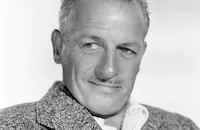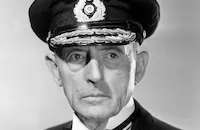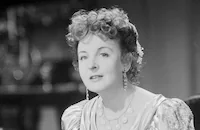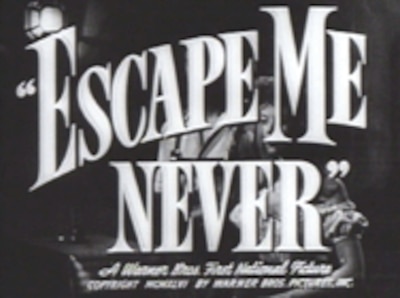Escape Me Never

Brief Synopsis
Cast & Crew
Peter Godfrey
Errol Flynn
Ida Lupino
Eleanor Parker
Gig Young
Reginald Denny
Film Details
Technical Specs

Synopsis
In Venice in 1900, the romance between aspiring composer Caryl Dubrok and wealthy Fenella MacLean is abruptly ended by her parents when they mistakenly conclude that Caryl shares a room with young widow Gemma Smith and her baby Piccolo. After Fenella's parents rush her off to the Dolomites, a distraught Caryl learns that Gemma actually lives with his brother Sebastian, who took in the young mother and the baby. When Sebastian learns about the misunderstanding, he insists that they go after Fenella and explain the facts. At first, Sebastian plans to leave Gemma and Piccolo behind, but when she suggests that she may accept a marriage proposal from a neighboring baker, Sebastian agrees to include her in the party. The four set off on foot, singing for money. Sebastian is also a composer, but is waiting for something or someone to inspire his efforts. One evening, when Sebastian and Gemma perform without Caryl, who has injured his foot, Sebastian is drawn to a beautiful woman, not knowing she is Fenella. Sending Gemma home, Sebastian remains behind to flirt with Fenella, and is inspired to compose a melody that he will use as the basis for a ballet. The following day, when Gemma goes to the hotel to collect their pay, she learns Fenella is staying there and explains the mixup. Fenella is so upset at learning that Sebastian is Caryl's brother that Gemma quickly arranges to leave with Sebastian. Gemma and Sebastian marry and move to London, where he continues to work on his ballet. The MacLeans also return to London, followed by Caryl, who takes a job as a music agent and becomes engaged to Fenella. After Sebastian finishes his composition, Fenella arranges for a performance. The music is well-received, and Fenella and Sebastian renew their relationship. One day, in the midst of rehearsals for the ballet, Piccolo becomes very ill, but Sebastian refuses to leave rehearsals to accompany Gemma to the hospital. Later, Fenella tells Sebastian that she has broken her engagement to Caryl and suggests that they take a brief vacation at her family's home in the country. While Fenella and Sebastian are in the country, Piccolo dies, and Gemma disappears. On his return to London, Sebastian realizes how much Gemma means to him, and rewrites the ballet in her honor. Gemma attends the first performance and is reconciled with Sebastian.

Director

Peter Godfrey
Cast

Errol Flynn

Ida Lupino

Eleanor Parker

Gig Young

Reginald Denny

Isobel Elsom

Albert Basserman

Ludwig Stossel
Milada Mladova
George Zoritch
Helene Thimig

Frank Puglia

Frank Reicher
Hector Sarno
George Humbert
Alfredo Sabato
Mario Siletti
Robert St. Angelo
Michael Chubb
David Chubb

Anthony Caruso
Leon Lenoir

Angela Greene
Fay Wall
Will Kaufman
Ivan Triesault
Barry Bernard

Doris Lloyd

Leonard Mudie
Lee Gregory
Jane Harker
Helen Pender
Joan Winfield
Crew
Gerald W. Alexander
Claude Archer
Harry Barndollar
Henry Blanke
Russell Collings
Paul Detlefsen
Leo F. Forbstein
Jack Ford
Charles David Forrest
Aldo Franchetti
Hugo Friedhofer
Al Greene
Ted Koehler
Clarence Kolster
Erich Wolfgang Korngold
Erich Wolfgang Korngold
Peg La Centra
Mario Larrinaga
Fred M. Maclean
Bernard Newman
Sol Polito
Leroy Prinz
Robert Stevens
Dolph Thomas
Travilla
Bertram Tuttle
Willard Van Enger
Jack L. Warner
Robert G. Wayne
Perc Westmore
Carl Weyl
Thames Williamson

Film Details
Technical Specs

Articles
Escape Me Never
Kennedy had adapted her 1928 novel The Fool of the Family for the London stage in the '30s, and the story had already been filmed in Britain in 1935 with Elisabeth Bergner and Hugh Sinclair. The story, which opens in turn-of-the-century Vienna, concerns Gemma Smith (Ida Lupino), an impoverished young single mother scraping out survival for herself and her infant by any means possible. Her plight moves the struggling Bohemian composer Sebastian Dubrok (Errol Flynn) who offers the pair shelter in his meager digs.
The situation is misread in turn by Sebastian's stodgy brother Caryl (Gig Young), who turned his back on his musical training in favor of a modestly successful business career, and then by Caryl's fiancée, the beautiful, aristocratic Fionella MacLean, who storms out in the mistaken belief that Caryl is involved with Gemma. The brothers Dubrok gather up Gemma and the baby and follow Fionella to the Alps to attempt to make an explanation.
In the course of the pursuit, Sebastian finds himself falling for Fionella, resolving to craft a ballet in her name. Torn because of Caryl's feelings, he decides marriage to the devoted Gemma will keep him from further pursuit of his sister-in-law to be. The pull of his attraction to Fionella, however, proves too great, and it takes a tragedy for him to ultimately discover where his priorities lie.
The project wasn't a memorable one for the great screen swashbuckler Flynn, whose apparent comfort level with both the material and the Tyrolean suspenders he donned is about what you would expect. Ida Lupino, whose versatility and talent were rarely given a decent showcase at Warner Bros., faired better in creating a sympathetic gamine. She harbored warm memories of the film that were shared with John Kobal in his interview anthology People Will Talk. "I loved Errol Flynn, who was one of my dear, dear, dear friends...He was just marvelous. Fun and well, a very kind person, very sensitive. He used to call me 'Mad Idsy' and I used to call him 'The Baron'."
Young would look back at his thankless assignment with far less affection, as recounted in George Eels' biography Final Gig, which was published in the wake of the 1978 murder/suicide that took the performer and his younger wife. "I was cast as Errol Flynn's brother in a film at Warners and if you recall at the time he was The King of the lot," Young told journalist Joan Schmitt. "If I hadn't been so naïve I would have known that this would turn out to be his dull brother. But I didn't get the message until I was told to keep my hands in my lap during my big romantic scene."
Escape Me Never didn't demand more from Eleanor Parker than to be primly beautiful, a task that she of course fulfilled. Warner house director Peter Godfrey would very soon afterwards work with her again to much more resounding effect as the twin sisters menaced by Sydney Greenstreet in the Gothic thriller The Woman in White (1948).
Producer: Henry Blanke, Jack L. Warner
Director: Peter Godfrey
Screenplay: Thames Williamson, Lenore J. Coffee, Margaret Kennedy (novel/play)
Cinematography: Sol Polito
Film Editing: Clarence Kolster
Art Direction: Carl Jules Weyl
Music: Erich Wolfgang Korngold
Cast: Errol Flynn (Sebastian Dubrok), Ida Lupino (Gemma Smith), Eleanor Parker (Fionella MacLean), Gig Young (Caryl Dubrok), Reginald Denny (Mr. MacLean), Isobel Elsom (Mrs. MacLean).
BW-104m. Closed captioning.
by Jay S. Steinberg

Escape Me Never
Quotes
Trivia
Notes
According to a November 12, 1945 Hollywood Reporter news item, this film was the first Warner Bros. picture to be completed after a strike shut down production. An undated press release included in the file on the film at the AMPAS Library announced that Lenore Coffee was to write the screenplay. Margaret Kennedy's play was the basis for the 1935 British film Escape Me Never released in the United States by United Artists. It starred Elisabeth Bergner and Hugh Sinclair and was directed by Paul Czinner (see AFI Catalog of Feature Films, 1931-40; F3.5331).















